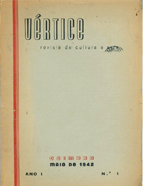

................................
It should also be noted that the analysis of the history texts in Vértice raises questions about the sometimes uncritical or unexplained use of the analytical category ‘Marxist historiography’. While it is true that there are some common ideas that make its use relevant, it cannot be based solely on the political affiliation of the historians in question, nor on the set of general ideas they adopted. From a historiographical point of view, differences can be noted in the interpretation of certain key moments in the history of Portugal and also in the conceptions and uses of history, as we have seen. And while historiographical controversies and debates were not a privileged means of discussing these differences, they were nevertheless present, sometimes implicitly. As can be seen in the debate on the different artistic conceptions of the intellectuals who opposed the Estado Novo, there was also no theoretical and interpretative unanimity in historiography.
.
Bibliografia passiva: ANDRADE, Carlos Santarém, Vértice, Índice de Autores: 1942-1986, Coimbra, Vértice, 1987; ANDRADE, Luís, Intelectuais, Utopia e Comunismo. A inscrição do marxismo na cultura portuguesa, Lisboa, Fundação Calouste Gulbenkian / Fundação para a Ciência e Tecnologia, 2010; GODINHO, Vitorino Magalhães, “A historiografia portuguesa do século XX – orientações, problemas, perspectivas” (1955), Ensaios, vol. III, Lisboa, Livraria Sá da Costa Editora, 1971, 229-47; HESPANHA, António Manuel, “A história na cultura portuguesa contemporânea”, in Fernando Peres (coord.), Panorama da Cultura Portuguesa no Século XX, vol. 1, Porto, Edições Afrontamento / Fundação de Serralves, 2002,
pp. 327-50; MADEIRA, João, Os Engenheiros de Almas. O Partido Comunista e os intelectuais, Lisboa, Editorial Estampa, 1996, pp. 277-305; IDEM, “Os novos remexedores da história”, in David Santos (coord.), Batalha pelo Conteúdo. Exposição documental. Movimento neo-realista português, Vila Franca de Xira, Câmara Municipal de Vila Franca de Xira / Museu do Neo-Realismo, 2007, pp. 304-331; MAURÍCIO, Carlos, “História. – Da consolidação da história metódica à lenta renovação do pós-guerra”, in António Barreto e Maria Filomena Mónica (coords.), Dicionário de História de Portugal, vol. VIII, [s.l.], Livraria Figueirinhas, 1999, pp 172-177; NEVES, José, Comunismo e Nacionalismo em Portugal (política, cultura e história no século XX), Lisboa, Tinta-da-China, 2010, pp. 303-58; PINA, Ana Maria, A Quimera do Ouro. Os intelectuais portugueses e o Liberalismo, Oeiras, Celta Editores, 2003; PIRES, Daniel, “Vértice”, in Dicionário da Imprensa Periódica Literária Portuguesa do Século XX (1941-1974), vol. II, 2º. tomo, Lisboa, Grifo, 2000, pp. 593-632; RAMOND, Viviane, A Revista Vértice e o Neo-Realismo Português, Coimbra, Angelus Novus, 2008; SERRÃO, “Brevíssima reflexão preambular sobre historiografia, ideologia e tempo”, in A Emigração Portuguesa. Sondagem histórica, 4ª. ed., Lisboa, Livros Horizonte, 1982 [1ª. ed., 1972], pp. 9-23.
José de Sousa
This work is financed by national funds through FCT - Foundation for Science and Technology, I.P, in the scope of the projects UIDB/04311/2020 and UIDP/04311/2020.
